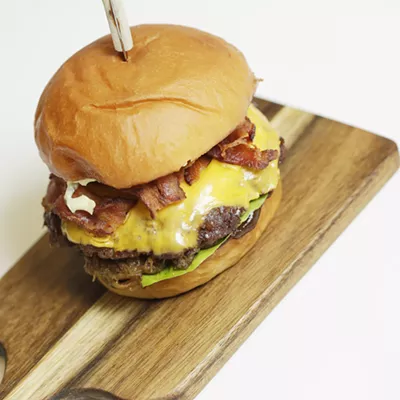It's August in Spokane, meaning it's the time of year that everyone wakes up in the morning with the same question: "Can I breathe clean air today?"
So far this week, the answer has been "no." The headlines yesterday morning called the air quality in Spokane the "worst in the country," which is becoming something of an annual feat. And the Washington Smoke Information page yesterday posted a blog with this headline (emphasis mine) "Eastern WA smoke pummeling the funneling point (Spokane) until Thursday."
The blog, written by Washington Department of Ecology atmospheric scientist Ranil Dhammapala, went on to say that Spokane is "the meeting point for smoke from Eastern Washington fires exiting the state." It showed a satellite picture showing smoke from two nearby fires drifting right into the Spokane area.
What is it, then, that seemingly makes Spokane a magnet for the smoke?
This week, it's relatively simple. The Williams Flats Fire on the Colville Reservation is close by and producing a bunch of smoke, and the weather pattern has been the same each of the last few days. The wind blows the smoke in the early part of the day down toward the Columbia Basin, and in the latter part of the day, southwest winds flush the smoke into the Spokane area.
But Spokane has been suffocated with smoke before, even when fires causing it are as far away as California or Canada. Part of it is the luck of the draw that depends on what the weather is doing, Dhammapala says. But part of it is the terrain.
"Spokane is in a valley ... and for the eastern part of the state there is a bit of a terrain depression," he says. "Smoke that gets in there doesn't easily get out."
It's one of a few factors working against Spokane when it comes to smoke, says Rocco Pelatti, a meteorologist with the National Weather Service in Spokane. We're close to forests that tend to be catching on fire more and more lately. We're in a bit of a valley, and smoke tends to find low spots like the Spokane River especially at nights and evenings.
And then once it gets here, it tends to stay for longer, he says. A place like Seattle gets more rain that flushes out the smoke. A place like Denver is located where there aren't as many valleys, so when rain does come it flushes smoke out more easily.
"They don't have big deep valleys that are going to hold onto pollution for long periods," Pelatti says.
Still, Dhammapala says other cities have a similar problem. Boise is similarly prone to smoke accumulations. Closer to home, Yakima is conducive to trapping smoke as well. The fact that Spokane now annually boasts the worst air quality in the country doesn't make it so different than other places.
"It's not terribly unique," Dhammapala says. "It's not like the worst place to be or anything like that."
So at least there's a bit of silver lining for you as you choke on the Pacific Northwest air.






















